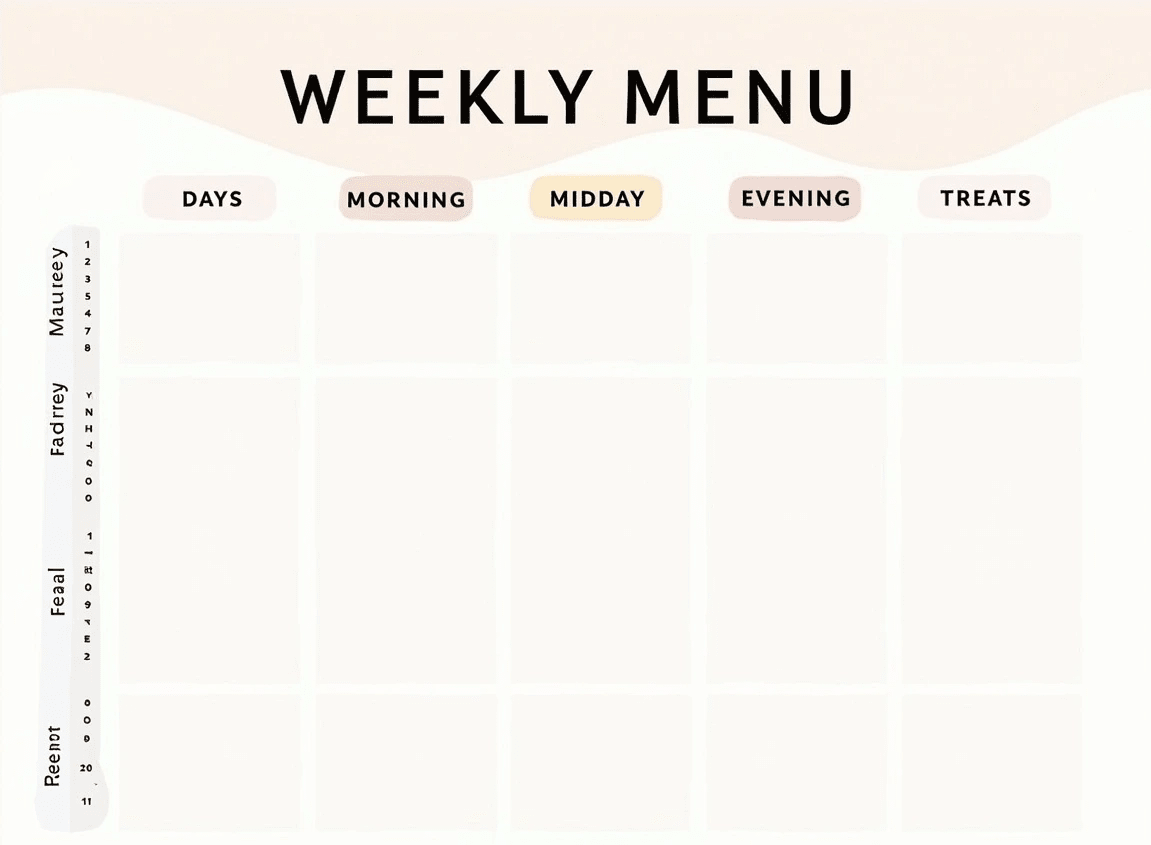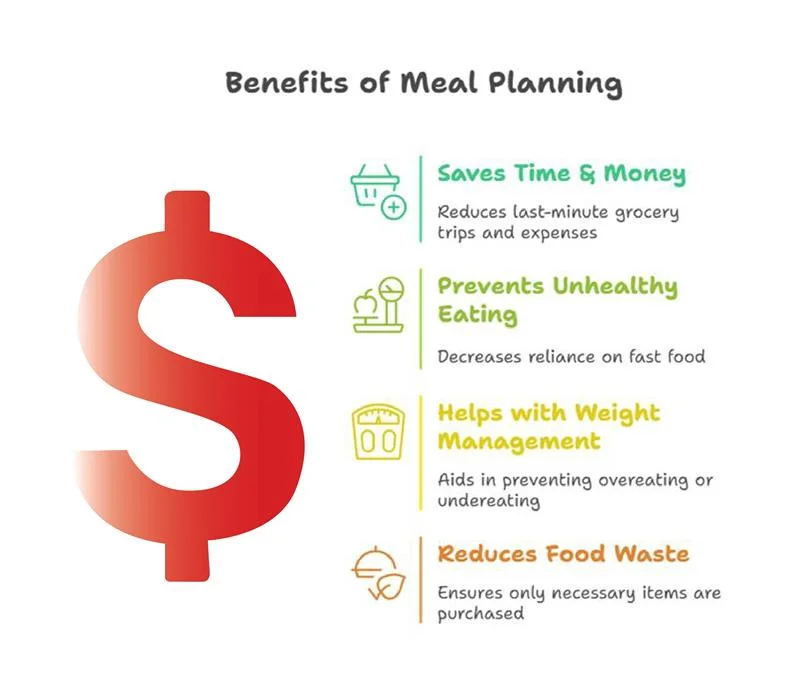
Choose the Best Meal Recipe Planner | Stay Aligned with Your Goals
2025-03-19
By planning meals in advance, a meal and recipe planner helps you simplify healthy eating, save time, and stay on track with your nutrition goals. It eliminates last-minute food choices, reduces reliance on unhealthy options, and ensures a balanced diet tailored to your needs, whether for weight loss, muscle gain, or overall wellness. With structured meal plans, grocery list organization, and easy meal prep, you can maintain consistency and make stress-free, nutritious choices every day.

Introduction
Struggling with last-minute meal choices, inconsistent eating habits, or unhealthy takeout? You're not alone. Many people face challenges when trying to stick to a healthy diet, whether it's for weight loss, muscle gain, or simply maintaining a balanced lifestyle. The secret to solving these issues? Meal planning.
Meal planning isn't just about organizing what you'll eat. It’s about taking control of your nutrition, reducing stress around food, and making your health goals more achievable.
In this guide, we’ll break down everything you need to know about meal planning, from choosing the best meal plan for your lifestyle to practical meal prep tips.
By the end of this guide, you'll have a clear roadmap to meal planning success. No more confusion or frustration! Plus, we’ll introduce you to Meal and Recipe Planner with Foodsie, a powerful tool that simplifies meal planning and helps you stay on track effortlessly.
What is Meal Planning and Why It’s a Game-Changer?
Meal planning is the process of deciding your meals in advance based on your nutritional needs, lifestyle, and goals. Instead of scrambling to decide what to eat at the last minute, you have a structured plan beforehand that ensures you're eating healthy, balanced meals consistently.
Why Meal Planning is Essential?
- . Saves Time & Money: No more last-minute grocery runs or unnecessary food expenses.
- . Prevents Unhealthy Eating: Pre-planned meals reduce reliance on fast food and junk food.
- . Helps with Weight Management: Structured eating prevents overeating or undereating.
- . Reduces Food Waste: Knowing what to cook helps you buy only what you need.
Who Needs Meal Planning?
- . Busy professionals who struggle with meal prep.
- . People trying to lose weight, gain muscle, or maintain a balanced diet.
- . Parents who want to save time and prepare healthier meals for their families.
- . Anyone who wants to reduce stress around food choices.
How to Pick the Best Meal Plan for Your Goals
Step 1: Identify Your Goal
Your meal plan should align with your personal health and fitness goals.
- . Weight loss: A low-calorie, nutrient-dense meal plan.
- . Muscle gain: A high-protein, high-calorie meal plan.
- . Balanced eating: A macro-focused, well-rounded diet.
Step 2: Choose Your Approach
1. Calorie-Based Meal Plans.
- . 1000-1800 Calories: Best for weight loss.
- . 2000-2500 Calories: Great for maintaining weight.
- . 3000-4000 Calories: Ideal for muscle gain and high-performance athletes.
2. Macro-Based Meal Plans.
- . 90-30-50 Meal Plan: A balanced ratio of carbs, proteins, and fats.
- . High-Protein, Low-Carb Plan: Best for fat loss & muscle growth.
3. Time-Based Meal Plans.
- . 7-Day Meal Plans: A structured weekly meal plan for consistency.
- . Monthly Meal Planner: Helps with long-term meal planning and budgeting.
Step-by-Step Guide to Meal Planning
Step 1: Calculate Your Caloric & Macronutrient Needs
- . Use a calorie calculator to determine daily energy needs.
- . Understand protein, carb, and fat intake for your goals.
Step 2: Plan Your Meals (Customizing Your Diet)
- . For Weight Loss: Choose low-calorie meals and nutrient-dense meals.
- . For Muscle Gain: Focus on high-protein meals and calorie surplus.
- . For Energy & Wellness: Stick to balanced macro meals.
Step 3: Grocery Shopping & Meal Prep Tips
- . Buy fresh, whole foods instead of processed items.
- . Batch cook 2-3 times a week to save time.
- . Use meal prep containers to portion meals correctly.
Pro Tip: Shopping with a pre-planned grocery list saves time, reduces waste, and keeps you on track!

Meal Planning Mistakes to Avoid
- . Limited Variety: Eating the same meal every day can lead to boredom and nutritional deficiencies
- . Skipping Meal Prep Days: Leads to impulsive eating and unhealthy choices.
- . Not Adjusting Portion Sizes: Overeating, even with healthy meals, can still lead to weight gain.
Solutions:
- . Rotate 3-4 different meal plans weekly.
- . Prep snacks and backup meals to avoid eating out.
- . Use Foodsie’s Meal Planner to customize and organize meals easily.
Best Meal Planning Tools & Apps
- . Macro Meal Planner Apps – Track your macros & calories with ease.
- . Recipe Organizer – Save your favorite healthy recipes for easy access.
- . Grocery List Generators – Create automated shopping lists based on your meal plan.
Conclusion & Next Steps
Meal planning is a powerful tool that helps you stay consistent, eat healthier, and reach your nutrition goals. Whether you’re looking to lose weight, gain muscle, or maintain a balanced diet, having a structured plan makes all the difference.
Instead of struggling with meal decisions daily, why not simplify the process? Foodsie’s Meal Planner makes meal planning effortless—helping you stay on track with nutritious, easy-to-prepare meals.
Start planning smarter today with Foodsie!
Frequently Asked Questions
1. Is meal planning really effective for weight loss or fitness goals?
Yes meal planning is one of the most effective strategies for weight loss, muscle gain, or maintaining a healthy lifestyle. When you plan in advance, you control portion sizes, calorie intake, and food quality. This reduces impulsive eating, dependence on fast food, and unnecessary snacking. Studies show that people who follow a structured meal plan are more consistent with their nutrition and reach their health goals faster compared to those who make last-minute food choices.
2. How do I choose the right meal plan for my lifestyle?
The best meal plan is the one that matches both your health goals and your daily routine.
-
. For weight loss, look for a low-calorie, nutrient-dense plan that keeps you full without excess calories.
-
. For muscle gain, prioritize high-protein meals with a calorie surplus.
-
. For balanced wellness, choose a macro-focused plan with a mix of carbs, proteins, and healthy fats.
Also consider your schedule busy professionals may benefit from a weekly 7-day plan, while families may find monthly planners better for budgeting and variety.
3. What are the biggest mistakes to avoid in meal planning?
Common mistakes include:
-
. Eating the same thing daily, which leads to boredom and nutrient gaps.
-
. Skipping prep days, which often results in takeout or unhealthy snacks.
-
. Ignoring portion sizes, which can cause overeating even with healthy meals.
To avoid these, rotate different meal options weekly, prepare backup snacks, and portion meals in advance using containers. This way, you’ll keep your meals exciting, consistent, and aligned with your health goals.